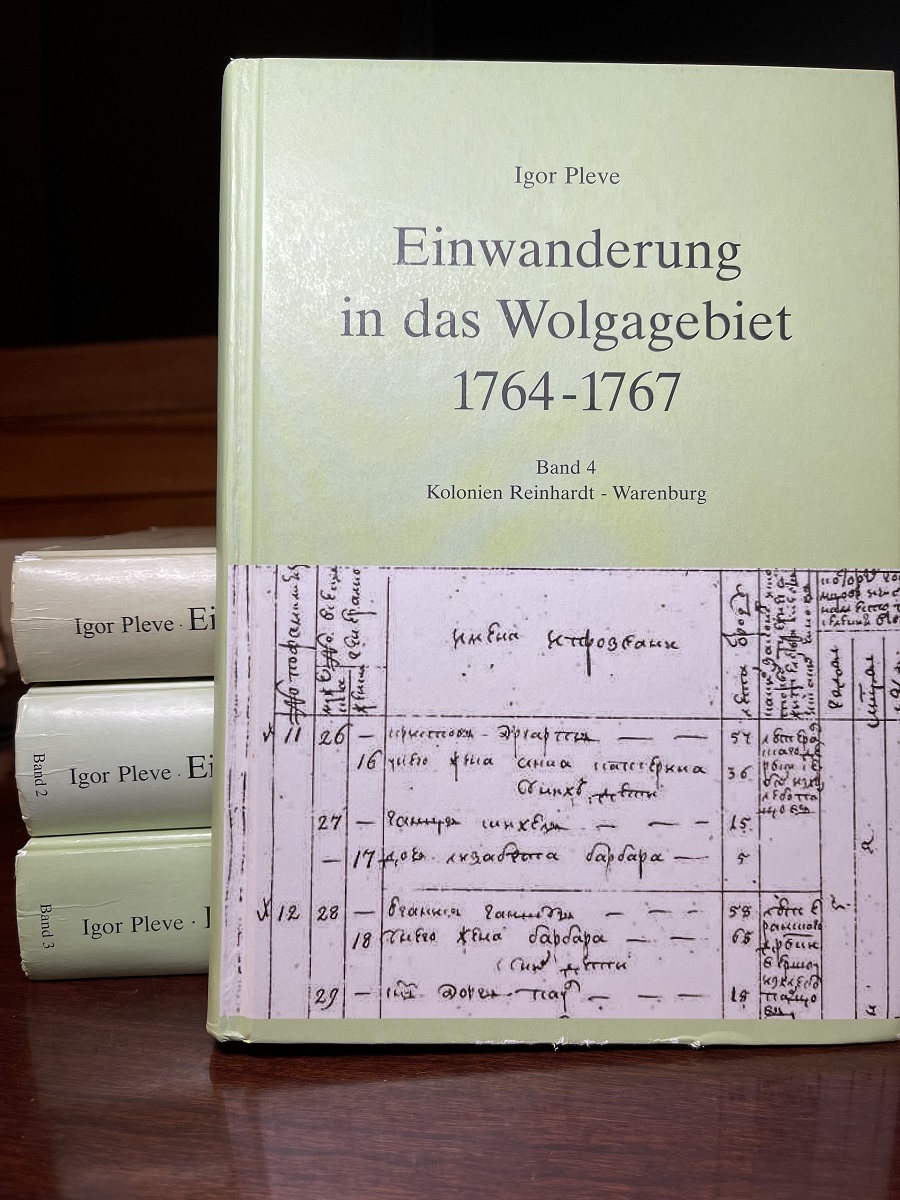Documenting where your Volga German ancestors lived prior to their immigration to Russia isn't easy. I've previously written about some of the challenges of doing this research. The main source for identifying a possible origin location is the First Settlers Lists (1767 Censuses) for the Volga German villages. If your family does not appear on any of the published First Settlers Lists, you will need to explore other documents that might fill in the missing details in your family history.
What I am referring to when I speak about the "published First Settlers Lists"? I am primarily talking about the four-volume set Einwanderung in das Wolgagebiet 1764-1767 by Dr. Igor Pleve. All four of these books are currently in print and can be purchased from the American Historical Society of Germans from Russia (AHSGR) Bookstore. The descriptions in the AHSGR Online Store list which colonies are included in each of the four volumes. Another source for First Settlers Lists is Karl Stumpp's "The Emigration from Germany to Russia in the Years 1763-1862", though this book only includes a few Volga colony lists. In addition to these two sources, some independent researchers have obtained copies of these lists from the Russian archives and prepared their own translations.
There are many reasons why your ancestors might be missing from these published lists:
Not all of the First Settlers Lists have been found and published
There are a total of 17 Volga German colonies whose First Settlers Lists are not included in the published translations. The bad news is that most of these lists appear to be completely lost. The good news is that other published documents might provide useful information about your ancestors. Analyzing other sources, such as comparing families reported on the Kulberg Lists to families reported on the 1798 Census might help identify your ancestors. A good example of this type of analysis is the "Reconstructed First Settlers List" for the village of Hussenbach created by Susan Nakaji.
Many immigrants died during the journey to the villages
The journey from your ancestor’s birthplace in Western Europe to the Volga German settlement area took more than a year. It was a difficult journey, and many would-be colonists died before arriving in the colonies. It was not uncommon for re-marriages to occur, resulting in a blended family appearing on the published First Settlers List. The published First Settlers Lists don’t always indicate when children have a surname different from the head of household. You can sometimes identify these situations, and I give an example of that type of analysis in another blog post.
Some settlers arrived as late as 1773
We generally think of 1763-1767 as the years of Volga German settlement, and the majority of the Volga German colonists did arrive in those years. A lesser-known fact is that there were some colonists who arrived after 1767, and as late as 1773. AHSGR has published some materials about these later arriving groups.
In addition to the AHSGR publications, Andreas Idt and Georg Rauschenbach provide new and more detailed information about some of these later arrivals in two of their books:
- Einige Kapitel aus der Geschichte des Kolonisationsprojects von Katharina II, 1763-1775, and
- Die "Berufer" Abenteuer der Aufklärung in Katharinas II. Kolonisierungsprojekt
The Einige Kapital book includes many previously unpublished details about the settlers who arrived in 1773. For example, this book includes details about the families who initially settled in Pobochnaya, along with information about families in the Pobochnaya group who relocated to other colonies. The Berufer book includes, for example, a list of families who had been recruited by Baron Caneau de Beauregard but who hadn't yet arrived in the colonies in 1767.
Your ancestor might have been a Napoleonic War POW
Napoleon Bonaparte's army invaded Russia in 1812 with disastrous consequences. Of the estimated half a million soldiers in that army, only one hundred thousand are estimated to have survived the invasion. Some of the prisoners captured by the Russians decided to become Russian citizens, and nearly 200 of those eventually settled in Volga German colonies. Steve Schreiber has written about this topic, using my research on Michael Alexander as an example of one French soldier who settled in Norka.
Don't give up the search if you can't find your ancestors on the published First Settlers Lists. You might still be able to document their journey and identify their origin location using one of the publications mentioned above.
© Margreatha Hein, 2025
